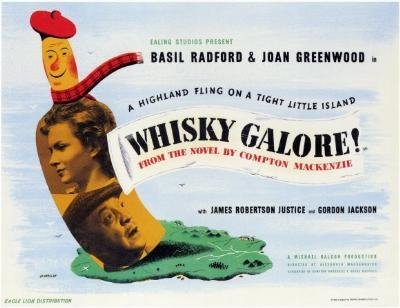
WHISKY GALORE
UK, 1949, 82 minutes, Black and white.
Basil Radford, Catherine Lacey, Bruce Seaton, Joan Greenwood, Wiley Watson, Gordon Jackson, Jean Cadell, James Robertson Justice, John Gregson, Duncan Macrae.
Directed by Alexander Mc Kendrick.
Whisky Galore is based on a novel by Compton Mac Kenzie who collaborated on the screenplay with writer Angus MacPhail?, writer of a number of the Ealing Studios serious films including It Always Rains on Sunday, Loves of Joanna Godden and Train of Events.
The film was the first-time direction by American-born Alexander Mc Kendrick who went on to make The Maggie and The Man in the White Suit as well as The Sweet Smell of Success in the United States.
The film was based on an actual event, the SS Politician, loaded with whisky, foundered outside the Outer Hebrides islands during World War Two and the islanders took advantage of getting as much of the alcohol as they could. This time, the fictitious setting is after the war, fifty thousand cases of whisky come from the stranded ship but the home county's official stands between the whisky and the islanders who want to plunder and loot.
There are a lot of character actors from British films, led by Basil Radford (with Naughton Wayne, so memorable in The Lady Vanishes). A young Joan Greenwood appears as does Gordon Jackson and John Gregson. This was also an early film for the blustering James Robertson Justice.
The film is considered one of the best of the Ealing Studios comedies, made early in their good years of humorous films. Kind Hearts and Coronets appeared also in 1949.
There is some interest in the history of the title of the film. In the United States, the Motion Picture Code prevented alcohol being specifically named in the title so it was renamed Tight Little Island - with a message at the end that the islanders did not profit from plundering the whisky (which, in fact, of course in the film they did). In France, on the contrary, the title of the film was Whisky a Go- Go.
1. How successful a comedy was this? What was the purpose of the film? What is the purpose of comedy? To make audiences laugh, to give audiences insight? If this is so, how successful a comedy was this film?
2. How satirical was the film? the opening commentary, the presentation of the situations? the satire on Scotland and Scottish behaviour? On drinking, on authority, on the war? was it effective satire? Was it too black or was it justified? (What would a Scotsman think?)
3. Comment on the style of the film, the black and white photography, the local scene, location photography, the music, the humour, the details of ordinary Scottish life and their impact?
4. How successful was the commentary device? How humorous was it? How did it affect the audience - in their sympathies, their way of looking at the characters and the situation?
5. How real were the people in the film? were they characters or caricatures? How important was it that they were Scottish? Did their environment and isolation explain them? How well did the film show customs and styles? How well did we understand the people and their ways?
6. What features of Scottish characters and life were most impressive in the film? The life in the village, the solidarity, the importance of whisky, the importance of the war and its non-importance? Life at the inn? the nature of marriages and romance? George and his mother? (How humorous were these sequences - how biting and caustic?) George’s romance and his acceptance? The sergeant and Peg? The observing, of the Sabbath?
7. What wattro was there on the English? With the major and his authority? his lack of imagination, his letter of the law attitude? Reactions of the higher authorities to his interventions? His relationship with his wife and her comments?
8. Did you enjoy the happy ending? Was this the most fitting ending for the film? the role of the commentary here?
9. What insight into human behaviour via comedy, did the film offer?
10. The film is considered a classic of comedy. Why?